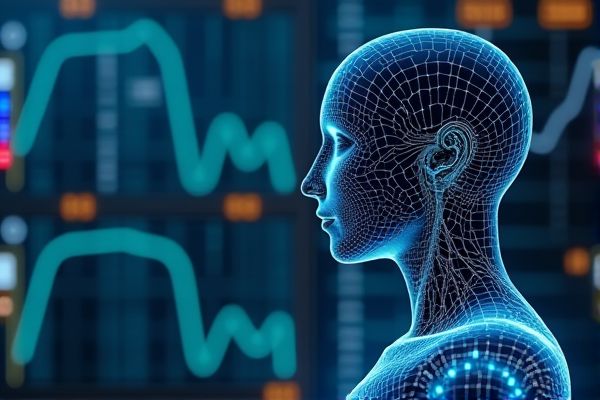
AI enhances healthcare diagnosis by analyzing vast amounts of medical data, improving the accuracy and speed of identifying conditions. Machine learning algorithms can identify patterns in imaging studies, pathology reports, and patient histories, leading to earlier detection of diseases such as cancer or heart conditions. Predictive analytics allow for personalized treatment plans by considering individual patient factors and outcomes from similar cases. This technology facilitates collaboration between healthcare professionals, ensuring that decisions are both data-driven and patient-centric.
AI usage in healthcare diagnosis
Predictive analytics
AI usage in healthcare diagnosis can enhance the accuracy and speed of identifying diseases. Predictive analytics can analyze patient data to foresee potential health issues, allowing for earlier intervention. For example, tools like IBM Watson Health can assist in determining treatment plans based on individual patient profiles. This technology opens up opportunities for personalized medicine, potentially improving patient outcomes.
Medical imaging analysis
AI can significantly enhance healthcare diagnosis through improved medical imaging analysis. For instance, algorithms trained on large datasets can identify patterns in radiology images, increasing accuracy in detecting conditions such as tumors. This technology may reduce the time required for diagnosis, allowing for quicker treatment initiation. The potential for AI to augment radiologists' capabilities suggests a promising advantage in patient outcomes.
Personalized treatment
AI has the potential to enhance healthcare diagnosis by analyzing large datasets to identify patterns that may not be immediately evident to human practitioners. This capability can lead to more accurate diagnoses, ultimately benefiting patient outcomes significantly. Personalized treatment plans can be tailored based on individual patient data, increasing the likelihood of effective interventions. Institutions like the Mayo Clinic are exploring AI technologies to refine their diagnostic processes and treatment methodologies.
Early disease detection
AI has the potential to enhance healthcare diagnosis by improving the accuracy of early disease detection. For instance, algorithms can analyze medical images to identify abnormalities that may indicate conditions like cancer. The use of AI technology may lead to earlier intervention, thus improving patient outcomes significantly. Institutions such as hospitals and research centers are increasingly exploring AI solutions for diagnostic purposes.
Drug discovery acceleration
AI enhances healthcare diagnosis by analyzing medical data more accurately and quickly, potentially identifying conditions earlier than traditional methods. In drug discovery, AI algorithms can predict molecular interactions, which may lead to faster development of new treatments. These technologies could significantly reduce the time and cost associated with bringing new drugs to market. Institutions like Stanford University are exploring AI applications in these areas, highlighting the potential advantages in clinical outcomes.
Clinical decision support systems
AI usage in healthcare diagnosis can enhance accuracy and efficiency in identifying conditions. Clinical decision support systems can analyze vast amounts of medical data to provide recommendations to healthcare professionals. The integration of these technologies may lead to improved patient outcomes and reduced diagnostic errors. For instance, IBM Watson has shown potential in aiding oncologists with cancer treatment decisions.
Patient data management
AI has the potential to significantly enhance healthcare diagnosis by analyzing vast amounts of patient data quickly and accurately. Machine learning algorithms can identify patterns in medical records that may not be immediately apparent to healthcare professionals. For example, institutions like the Mayo Clinic are incorporating AI to streamline patient data management processes. This could lead to earlier detection of diseases and more personalized treatment plans, ultimately improving patient outcomes.
Natural language processing in EHRs
AI can enhance healthcare diagnosis by analyzing vast amounts of patient data for patterns, potentially improving accuracy and speed. Natural language processing (NLP) in electronic health records (EHRs) allows for better interpretation of unstructured data, which may lead to more informed clinical decisions. The integration of these technologies could reduce misdiagnoses and optimize treatment plans. Institutions like hospitals could leverage these advancements to improve patient outcomes and streamline operations.
Telemedicine enhancement
AI can improve accuracy in healthcare diagnosis by analyzing medical images and patient data to identify conditions early. Telemedicine platforms, such as Teladoc, can benefit from AI by streamlining patient-provider communications and ensuring timely interventions. These advancements increase access to care for patients in remote areas, enhancing their chances of receiving timely treatment. The integration of AI offers the possibility of lowering costs and improving patient outcomes significantly.
Risk stratification and assessment
AI applications in healthcare diagnosis can enhance accuracy and efficiency in identifying diseases. Risk stratification models can leverage patient data to predict potential health issues, leading to timely interventions. For example, an institution like Mayo Clinic may utilize AI-driven algorithms to prioritize patients based on their risk factors. This technology offers the potential advantage of improving patient outcomes while optimizing resource allocation.
 techknowy.com
techknowy.com